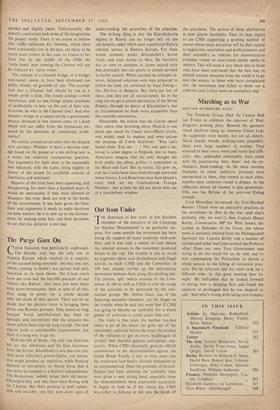The Purge Goes On C zecH Stalinism was particularly unpleasant. The
Slansky trial 'was the only one in Eastern Europe which resulted in a majority of the accused being executed : the only one, too, which, coming in Stalin's last period, had anti- Semitism as its main theme. The Czech rulers have not even had the horrible panache of real villains like Rakosi: they have just been nasty little terror-bureaucrats. And, in spite of all this, they clung to power for a whole, decade after the death of their patron. There can be no doubt that the decisive force in bringing them down was Russian pressure. They lasted so long because Soviet anti-Stalinism has been so sporadic and intermittent that the pressure has never before been kept up long enough. The new regime looks a considerable improvement, but there is a long way to go yet.
With the fall of Siroky, the only true Stalinists left are the Albanians and' the East Germans. Over the former, Khrushchev's writ does not run. And as to Ulbricht's prison-regime, any relaxa- tion might-produce an explosion, while Pankow depends so completely on Soviet force that it can never be tempted to a Stalinist independence. The Rumanians, indeed, retain their old leader, Gheorghiu-Dej; and they have been flirting with the Chinese. But their position is both vulner- able and unstable, and they now show signs of understanding the necessities • of the situation.
The striking thing is that the Khrushchevite regime in Russia can no longer rely on the old despotic cadre which once constituted Stalin's colonial service in Eastern Europe. For these would certainly prefer Khrushchev's Soviet rivals, and even incline to Mao. He therefore has to turn to elements in closer accord with him politically, but not nearly so closely devoted to Soviet control. Where possible he attempts in- terim, balanced solutions with men prepared to follow his lead, yet untainted by local feeling— like Zhivkov in Bulgaria. But there are few of these, and they are all second-raters. So in the long run we get a certain devolution of the Soviet .Empire, through no desire of Khrushchev's, but in circumstances he finds more acceptable than the available alternatives.
Meanwhile, the notion that the Czechs spend their entire time brooding about Munich is one much -put about by Czech semi-official circles, and widely used to explain and even excuse the excesses of Czech Stalinism : 'You can't blame them. You see . . .' This was and is be- lieved to some degree in England, just as many Americans imagine that the only thought the Irish public has about politics is resentment at the Black-and-Tans. But in reality, life goes on, and the Czechs have since lived through more and worse history. Lord Runciman may have played a nasty trick on the Czechoslovak Foreign Minister: but at least he did not throw him out of a fourth-floor window.


































 Previous page
Previous page